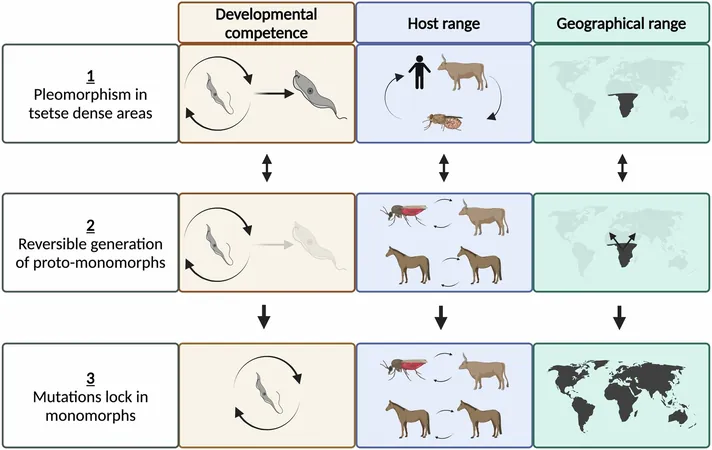
Alarming Genetic Mutations in Sleeping Sickness Parasites Threaten Global Health
2024-12-19
Author: Wei
Introduction
A groundbreaking study has unveiled a shocking revelation: the deadly parasites responsible for sleeping sickness, a disease primarily found in Africa, are evolving in ways that may allow them to spread across the globe. Experts warn that genetic mutations could facilitate their expansion beyond their native regions, raising serious concerns for public health worldwide.
Climate Change and Parasite Evolution
The research highlights a troubling intersection of climate change and strategies to control tsetse fly populations—the primary vectors of these parasites. As environmental conditions shift, the trypanosomes—known scientifically as African trypanosomes—are adapting by potentially bypassing the need for these flies to transmit the disease. This ominous development could directly impact not just animal health, but also human populations.
Global Spread of New Strains
Recent findings have detected new strains of these parasites infecting animals in locations as diverse as Asia, South America, and southern Europe. The implications are dire, as experts caution that similar adaptations could enable trypanosomes to initiate human infections outside their traditional African borders.
Genetic Research and Discoveries
Recent analyses conducted by a dedicated team from the University of Edinburgh have decoded the genetic traits of over 80 trypanosome samples sourced from human cases, tsetse flies, and various livestock. The meticulous work helped map out a genetic family tree of these parasites, uncovering significant molecular alterations that may simplify their life cycle, a crucial step facilitating their spread.
CRISPR Technology Contributions
Using sophisticated CRISPR-Cas9 gene-editing technology, researchers identified several mutations linked to the parasite's ability to disperse without the tsetse fly. These findings not only deepen our understanding of parasite evolution but also hint at strategies for fighting emerging strains.
Expert Opinions and Future Strategies
Professor Keith Matthews, co-lead of the study, expressed his alarm by saying, “These parasites have discovered means to extend their geographical range while eliminating the tsetse fly from their transmission cycle. Understanding the molecular changes at play is vital for detecting and combating these virulent strains that pose threats to both livestock and human health.”
Preventive Measures and Global Cooperation
In a bid to preemptively address these challenges, Dr. Guy Oldrieve, also from the University of Edinburgh, noted the team's commitment to developing a portable diagnostic tool that could facilitate early detection of outbreaks, potentially saving countless lives in the process.
Conclusion
As the world grapples with the realities of climate change and shifting ecosystems, the evolution of the sleeping sickness parasite reminds us that staying vigilant and responsive is imperative. Experts urge global cooperation to monitor and mitigate the spread of these mutated parasites before it’s too late. Will we be ready to tackle this impending health crisis? The clock is ticking!

 Brasil (PT)
Brasil (PT)
 Canada (EN)
Canada (EN)
 Chile (ES)
Chile (ES)
 España (ES)
España (ES)
 France (FR)
France (FR)
 Hong Kong (EN)
Hong Kong (EN)
 Italia (IT)
Italia (IT)
 日本 (JA)
日本 (JA)
 Magyarország (HU)
Magyarország (HU)
 Norge (NO)
Norge (NO)
 Polska (PL)
Polska (PL)
 Schweiz (DE)
Schweiz (DE)
 Singapore (EN)
Singapore (EN)
 Sverige (SV)
Sverige (SV)
 Suomi (FI)
Suomi (FI)
 Türkiye (TR)
Türkiye (TR)